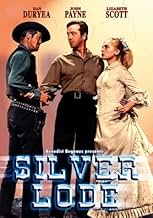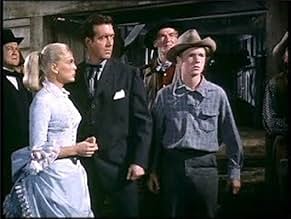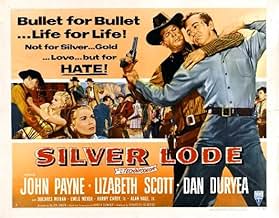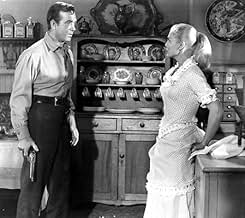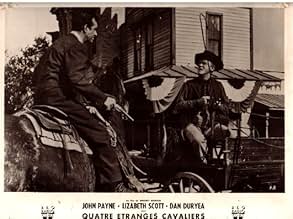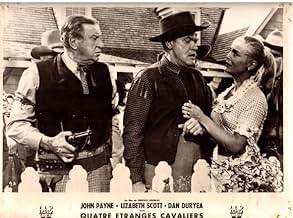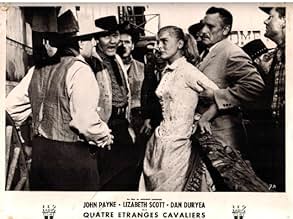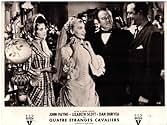VALUTAZIONE IMDb
6,8/10
2494
LA TUA VALUTAZIONE
In Silver Lode, Dan Ballard viene arrestato da quattro marescialli per omicidio e furto, ma nega le accuse e cerca il vero colpevole anche se i cittadini iniziano ad abbandonarlo.In Silver Lode, Dan Ballard viene arrestato da quattro marescialli per omicidio e furto, ma nega le accuse e cerca il vero colpevole anche se i cittadini iniziano ad abbandonarlo.In Silver Lode, Dan Ballard viene arrestato da quattro marescialli per omicidio e furto, ma nega le accuse e cerca il vero colpevole anche se i cittadini iniziano ad abbandonarlo.
Walter Bacon
- Townsman
- (non citato nei titoli originali)
Edgar Barrier
- Thad Taylor
- (non citato nei titoli originali)
Marshall Bradford
- Townsman
- (non citato nei titoli originali)
Recensioni in evidenza
The reason that led me to watch this movie is because it's listed in the book ''The 1001 Movies You Must See Before You Die'', and in the end it was worth-watching!
This Western follows the footsteps of ''High Noon''; here John Payne plays Dan Ballard, a man arrested by four marshals for a murder he didn't commit, and while he struggles to find the real culprit the townspeople start leaving him to his destiny. The only ones on his side are his soon-to-be-wife Rose (Lizabeth Scott) and saloon lady Dolly (Dolores Moran).
The things I liked about the movie are the music and the supporting cast: Dan Duryea shines as the evil sheriff McCarthy (that was a subtle reference to Joseph McCarthy) and in the end is killed by Payne in the church of Silver Lode; Stuart Whitman, Alan Hale jr. and Harry Carey jr. are great as the sheriff's henchmen, and they were specialized in Western movies.
Still a well-made Western and I liked it very much.
This Western follows the footsteps of ''High Noon''; here John Payne plays Dan Ballard, a man arrested by four marshals for a murder he didn't commit, and while he struggles to find the real culprit the townspeople start leaving him to his destiny. The only ones on his side are his soon-to-be-wife Rose (Lizabeth Scott) and saloon lady Dolly (Dolores Moran).
The things I liked about the movie are the music and the supporting cast: Dan Duryea shines as the evil sheriff McCarthy (that was a subtle reference to Joseph McCarthy) and in the end is killed by Payne in the church of Silver Lode; Stuart Whitman, Alan Hale jr. and Harry Carey jr. are great as the sheriff's henchmen, and they were specialized in Western movies.
Still a well-made Western and I liked it very much.
What could easily have been just another low-budget Western oater or, worse still, the poor man's HIGH NOON (1952), is turned by excellent scripting (atypically the work of a woman!) and direction into a true gem of the genre during its golden age. In fact, the film wears its anti-Red Scare intentions proudly on its sleeve by actually naming its chief villain (Dan Duryea in formidable form) McCarthy and making him an outlaw posing as a fake U.S. Marshal! Reformed gunfighter hero John Payne (in his first of four movies for veteran director Dwan) has his 4th of July wedding (to local belle Lizabeth Scott) disrupted by the arrival in town of Duryea and his men (including Stuart Whitman and Harry Carey Jr.) claiming to have a warrant for his arrest for killing Duryea's brother and absconding with the sum of $20,000. So far so conventional plot-wise but what is remarkable here is the way that the film-makers chose to employ the townspeople who are constantly following the protagonists around the streets of Silver Lode, at first forcibly siding with Payne (to the point of holding Duryea et al at gunpoint) but, with time, being swayed by the latter's lies and an unfortunate series of events that lead them to believe Payne guilty of murdering their sheriff (Emile Meyer) and one of the marshals, as well as wounding Scott's hot-headed brother. Aiding Payne, apart from the unwavering Scott (of course), is his ex-flame, sultry saloon gal (Dolores Moran, the wife of producer Benedict Bogeaus and whose last film this proved to be) who spits one-liner put-downs to hero, villain and everyone in between; I really liked her character and, apparently, so did Dwan because he opted to close the film on the image of her running frantically clenching the all-important telegraphic confirmation (Duryea's men had intuitively cut the lines beforehand) of Payne's claims of innocence. However, in view of the film being a thinly-veiled allegory on the ongoing witch-hunts, it is a telling comment on the relative nature of truth that the girls had already won the day by forcing the gullible telegraph official to write down a false reply. The expected climactic confrontation between Payne and Duryea, then, takes place inside a bell tower with the latter's bullet ultimately ricocheting on himself in God-like retribution making for a doubly ironic ending to a film (beautifully shot in color by the great John Alton) that had held its audience entranced for all of 77 breathless minutes.
"Silver Lode" has long been labeled as an anti-McCarthy western and has also been compared to "High Noon" (1952). The McCarthy witch hunt for communists in the motion picture business was in the headlines at the time this film was made. The persecution of the hero was said to be a thinly veiled protest of Senator Joseph McCarthy's persecution of the entertainment industry.
All that aside, "Silver Lode" stands as a pretty good western in its own right. True, the story can be compared to "High Noon" however, it is nevertheless an entertaining movie by itself.
Dan Ballard (John Payne) and Rose Evans (Lizabeth Scott) are about to be married when Marshal Ned McCart (Dan Duryea) and his three deputies (Alan Hale Jr, Harry Carey Jr., Stuart Whitman) ride into town looking for Ballard. McCart accuses Ballard of having murdered his brother and has come to arrest him and "take him back". At first the townspeople are on Ballard's side but gradually they turn against him especially when they believe that he has killed the town sheriff (Emile Meyer). Ballard then has to prove his innocence and expose McCart for the person he really is.
In addition to those mentioned above, there is an impressive list of familiar faces in the supporting cast. Dolores Morin plays saloon girl Dolly, Robert Warwick plays Judge Cranston, Hugh Sanders, the Reverend, Morris Ankrum, Scott's father, John Hudson her brother, Roy Gordon the town doctor and Myron Healey, Lane Chandler, John Dierkes, Gene Roth and I.Stanford Jolley as various townspeople.
Director Alan Dwan keeps the story moving and provides us with some good action scenes. And believe it or not there's not one fist fight in the entire movie.
Forget about the comparisons with McCarthyism and "High Noon" and sit back and enjoy an entertaining western.
All that aside, "Silver Lode" stands as a pretty good western in its own right. True, the story can be compared to "High Noon" however, it is nevertheless an entertaining movie by itself.
Dan Ballard (John Payne) and Rose Evans (Lizabeth Scott) are about to be married when Marshal Ned McCart (Dan Duryea) and his three deputies (Alan Hale Jr, Harry Carey Jr., Stuart Whitman) ride into town looking for Ballard. McCart accuses Ballard of having murdered his brother and has come to arrest him and "take him back". At first the townspeople are on Ballard's side but gradually they turn against him especially when they believe that he has killed the town sheriff (Emile Meyer). Ballard then has to prove his innocence and expose McCart for the person he really is.
In addition to those mentioned above, there is an impressive list of familiar faces in the supporting cast. Dolores Morin plays saloon girl Dolly, Robert Warwick plays Judge Cranston, Hugh Sanders, the Reverend, Morris Ankrum, Scott's father, John Hudson her brother, Roy Gordon the town doctor and Myron Healey, Lane Chandler, John Dierkes, Gene Roth and I.Stanford Jolley as various townspeople.
Director Alan Dwan keeps the story moving and provides us with some good action scenes. And believe it or not there's not one fist fight in the entire movie.
Forget about the comparisons with McCarthyism and "High Noon" and sit back and enjoy an entertaining western.
Silver Lode is directed by Allan Dwan and written by Karen DeWolf. It stars John Payne, Lizabeth Scott, Dan Duryea, Dolores Moran and Emile Meyer. Music is by Louis Forbes and cinematography by John Alton.
Dan Ballard (Payne) is a respected resident of the town Silver Lode, but on his wedding day Marshal Fred McCarty (Duryea) rolls into town looking to arrest him, accusing him of having murdered the Marshal's brother. The townsfolk refuse to accept the charge and stand up for Dan, and Dan loudly protests his innocence, but once suspicious mud is thrown it begins to stick and soon Dan finds himself running out of friends and is therefore forced to prove his innocence.
Two things always pop up when the film Silver Lode is spoken about, one is the similarities to High Noon, the other is the veiled allegory of Senator McCarthy and his witch hunts. These are two things which are hard to ignore, though as a "British" lover of Westerns myself, the McCarthy politico aspect doesn't really resonate, but Silver Lode deserves to primarily be known for being the damn fine Western that it is.
Fickle mob rule and knee jerk reactions drive Silver Lode forward, it's a thematic powder keg ignited with some skill by the prolific Dwann. Aided by the supremely talented Alton, Dwann achieves so much mood and tension from a small town set up, this is never dealing in expansive vistas, its primary goal is to suffocate Dan Ballard. Where once was freedom and love, now is a place closing in on him, with the story moving into a noir realm as Dan becomes a man whose past is proving to be inescapable. Then there is fate, another big noir ingredient, which has a big part in proceedings as events conspire to make Dan seem more of a guilty man the harder he tries to prove his innocence!
It's a lean and mean screenplay, devoid of filler and characterisations are colourful. Payne makes for a good put upon hero, his Dan Ballard as written is stoic and tough, and resilience needs to be his middle name. Duryea does another in his great line of weasels, and here he is wonderfully cloaked in suspicion from the off. Tagging behind him are his three equally suspicious cohorts (played by Stuart Whitman, Alan Hale Junior and Harry Carey Junior), while the upstanding town elders (Sheriff, Judge, Reverend) have time to make a mark before the fragile nature of small town justice begins to take a hold - and the clock is ticking down on Dan Ballard's life.
Most impressive is the influence on the story of the lady characters, so often a token interest in the "B" Westerns of the 50s. Deftly perched on either side of Ballard, the femmes are key characters in the piece. Rose Evans (Scott) is virtuous, brightly attired in white, she's the town sweetheart who Dan is set to marry, the question is will her loyalty to Dan remain? Dolly (Moran giving the best performance in the film and getting all the best lines) is a slinky saloon gal, in purple frills and with a tongue as sharp as a scorpion's sting, she still carries a torch for the unobtainable Dan.
Alton's colour photography is most appealing but we don't see the best of his work until the finale inside the town church. With clever use of light, shadows and colour enhancements, Alton is able to sum up the whole tone of the story in this segment. As for if the finale is worth the wait? It is, but it's a little mischievous. Certainly it's interesting, a quirk of fate again playing a hand as two men do battle in the church bell tower. Notably there's a religious angle dropped into the narrative, but I'm at a loss as to why that would be the case? Still, it's a very small irritant, for this is a cracker of a Western, a lesson in achieving big things from such small beginnings. 8.5/10
Dan Ballard (Payne) is a respected resident of the town Silver Lode, but on his wedding day Marshal Fred McCarty (Duryea) rolls into town looking to arrest him, accusing him of having murdered the Marshal's brother. The townsfolk refuse to accept the charge and stand up for Dan, and Dan loudly protests his innocence, but once suspicious mud is thrown it begins to stick and soon Dan finds himself running out of friends and is therefore forced to prove his innocence.
Two things always pop up when the film Silver Lode is spoken about, one is the similarities to High Noon, the other is the veiled allegory of Senator McCarthy and his witch hunts. These are two things which are hard to ignore, though as a "British" lover of Westerns myself, the McCarthy politico aspect doesn't really resonate, but Silver Lode deserves to primarily be known for being the damn fine Western that it is.
Fickle mob rule and knee jerk reactions drive Silver Lode forward, it's a thematic powder keg ignited with some skill by the prolific Dwann. Aided by the supremely talented Alton, Dwann achieves so much mood and tension from a small town set up, this is never dealing in expansive vistas, its primary goal is to suffocate Dan Ballard. Where once was freedom and love, now is a place closing in on him, with the story moving into a noir realm as Dan becomes a man whose past is proving to be inescapable. Then there is fate, another big noir ingredient, which has a big part in proceedings as events conspire to make Dan seem more of a guilty man the harder he tries to prove his innocence!
It's a lean and mean screenplay, devoid of filler and characterisations are colourful. Payne makes for a good put upon hero, his Dan Ballard as written is stoic and tough, and resilience needs to be his middle name. Duryea does another in his great line of weasels, and here he is wonderfully cloaked in suspicion from the off. Tagging behind him are his three equally suspicious cohorts (played by Stuart Whitman, Alan Hale Junior and Harry Carey Junior), while the upstanding town elders (Sheriff, Judge, Reverend) have time to make a mark before the fragile nature of small town justice begins to take a hold - and the clock is ticking down on Dan Ballard's life.
Most impressive is the influence on the story of the lady characters, so often a token interest in the "B" Westerns of the 50s. Deftly perched on either side of Ballard, the femmes are key characters in the piece. Rose Evans (Scott) is virtuous, brightly attired in white, she's the town sweetheart who Dan is set to marry, the question is will her loyalty to Dan remain? Dolly (Moran giving the best performance in the film and getting all the best lines) is a slinky saloon gal, in purple frills and with a tongue as sharp as a scorpion's sting, she still carries a torch for the unobtainable Dan.
Alton's colour photography is most appealing but we don't see the best of his work until the finale inside the town church. With clever use of light, shadows and colour enhancements, Alton is able to sum up the whole tone of the story in this segment. As for if the finale is worth the wait? It is, but it's a little mischievous. Certainly it's interesting, a quirk of fate again playing a hand as two men do battle in the church bell tower. Notably there's a religious angle dropped into the narrative, but I'm at a loss as to why that would be the case? Still, it's a very small irritant, for this is a cracker of a Western, a lesson in achieving big things from such small beginnings. 8.5/10
Released in 1954 - Silver Lode stands tall as a pretty decent Western in its own right. True. Its familiar story can easily be compared to "High Noon" in many ways, but, nevertheless, it is an entertaining cowboy flick, all the same.
Filmed with the obvious restrictions of its B-movie budget, this vintage, Technicolor Western tells the tale of Dan Ballard, a decent man (relatively new to town) who (on his wedding day, which also happens to be the 4th of July) finds himself being accused of cold-blooded murder and the theft of $20,000.
This unjust accusation is leveled at Ballard by Marshal McCarty, a very mean and forceful lawman, who unexpectedly arrives in town from Discovery, California, in the company of his 3 rough-looking deputies.
Needless to say, an intense conflict takes place that quickly escalates into an all-out gunfight which has almost every able-bodied man in town involved (and even some of the women).
With his life now hanging delicately in the balance, Ballard soon finds himself a hunted man in his own hometown. A vicious, mindless mob-mentality takes over as the citizens of Silver Lode pursue Ballard with a blind, hateful vengeance.
Silver Lode was a film that was very much a product of its time. It was produced during the "McCarthy" era, when film producers, writers and actors were called to account during a (literal) political witch hunt.
This film's screenplay reflects the concerns of the American people of that time in regards to matters such as truth and liberty in what they believed to be a free society.
With a running time of only 80 minutes, Silver Lode moved along at a really good clip. Its cast included John Payne, Dan Duryea, Harry Carey Jr., and Lizabeth Scott.
Filmed with the obvious restrictions of its B-movie budget, this vintage, Technicolor Western tells the tale of Dan Ballard, a decent man (relatively new to town) who (on his wedding day, which also happens to be the 4th of July) finds himself being accused of cold-blooded murder and the theft of $20,000.
This unjust accusation is leveled at Ballard by Marshal McCarty, a very mean and forceful lawman, who unexpectedly arrives in town from Discovery, California, in the company of his 3 rough-looking deputies.
Needless to say, an intense conflict takes place that quickly escalates into an all-out gunfight which has almost every able-bodied man in town involved (and even some of the women).
With his life now hanging delicately in the balance, Ballard soon finds himself a hunted man in his own hometown. A vicious, mindless mob-mentality takes over as the citizens of Silver Lode pursue Ballard with a blind, hateful vengeance.
Silver Lode was a film that was very much a product of its time. It was produced during the "McCarthy" era, when film producers, writers and actors were called to account during a (literal) political witch hunt.
This film's screenplay reflects the concerns of the American people of that time in regards to matters such as truth and liberty in what they believed to be a free society.
With a running time of only 80 minutes, Silver Lode moved along at a really good clip. Its cast included John Payne, Dan Duryea, Harry Carey Jr., and Lizabeth Scott.
Lo sapevi?
- QuizDolores Moran, who plays "Dolly" in the film, was married to producer Benedict Bogeaus at the time of production. It was her last film.
- BlooperWhen Ballard hides near a haystack outside the Evans house, his shadow and the shadows of his pursuers fall on to the painted backdrop, revealing it as canvas and not a real landscape.
- Citazioni
Dan Ballard: This man's accused me of murder.
- Curiosità sui creditiThe opening RKO Radio logo is in black and white.
I più visti
Accedi per valutare e creare un elenco di titoli salvati per ottenere consigli personalizzati
- How long is Silver Lode?Powered by Alexa
Dettagli
- Data di uscita
- Paese di origine
- Lingua
- Celebre anche come
- Silver Lode
- Luoghi delle riprese
- Aziende produttrici
- Vedi altri crediti dell’azienda su IMDbPro
- Tempo di esecuzione
- 1h 21min(81 min)
Contribuisci a questa pagina
Suggerisci una modifica o aggiungi i contenuti mancanti

